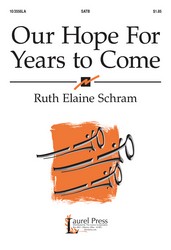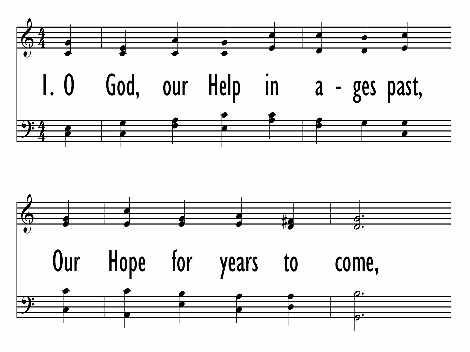- |
User Links
O God, Our Help in Ages Past
Hymn Information
- First Line
- O God, our help in ages past
- Author
- Isaac Watts, 1674-1719 (1719, alt.)
- Tune Name
- ST. ANNE
- Composer
- William Croft (1708)
- Topic
- God's: Faithfulness · God's: Providence · God As: Refuge/Safety/Shelter · Occasional Services: Anniversary · Occasional Services: New Year · Old Age · Perseverance · Time
Copyright Information
- Text Copyright
- Public Domain
- Tune Copyright
- Public Domain
- Reprint/Projection Information
- Words and Music: The Words and Music are in the Public Domain; you do not need permission to project or reprint the Words and Music.
Full Text
Scripture References
Thematically related:
- st. 1 =
- st. 2 =
- st. 3 =
- st. 4 =
- st. 5 =
- st. 6 =
Further Reflections on Scripture References
Considered one of the finest paraphrases written by Isaac Watts, "O God, Our Help in Ages Past" expresses a strong note of assurance, promise, and hope in the LORD as recorded in the first part of Psalm 90, even though the entire psalm has a recurring theme of lament. Watts wrote the paraphrase in nine stanzas around 1714 and first published the text in his Psalms of David (1719). The Psalter Hymnal includes the most well-known stanzas. The first line, originally "Our God, our help … ," was changed to "O God, our help… “by John Wesley in his Collection of Psalms and Hymns (1738). For further commentary on this psalm see PHH 90.
Psalter Hymnal Handbook
Extracted from the opening section of Psalm 90, Isaac Watts’ famous paraphrase expresses great assurance, promise, and hope in the Lord; it functions as a second national anthem in Britain.
Bert Polman
Confessions and Statements of Faith References
Further Reflections on Confessions and Statements of Faith References
In the passage of time, the child of God lives with expectancy—for God to renew them and for God to lead them in obedience (Our Song of Hope, stanza 9).
Even though time passes and years end swiftly, God is eternally faithful. And so God’s children testify using the words of Our World Belongs to God, paragraph 1: “As followers of Jesus Christ, living in this world—which some seek to control, and others view with despair—we declare with joy and trust: Our world belongs to God!”
O God, Our Help in Ages Past
Introductory/Framing Text
Call to Worship
Words of Praise
Confession
Blessing/Benediction
Additional Prayers
apart from you, our life is brief and meaningless.
In you we experience endless abundance.
Reveal to us all we can comprehend of our place in your design for eternity.
Help us to receive each new day as a gift, and to use your gift wisely and well,
so that we may live in joy and bring glory to Christ your Son, our Lord. Amen.
O God, Our Help in Ages Past
Tune Information
- Name
- ST. ANNE
- Key
- C Major
- Meter
- 8.6.8.6


 My Starred Hymns
My Starred Hymns






